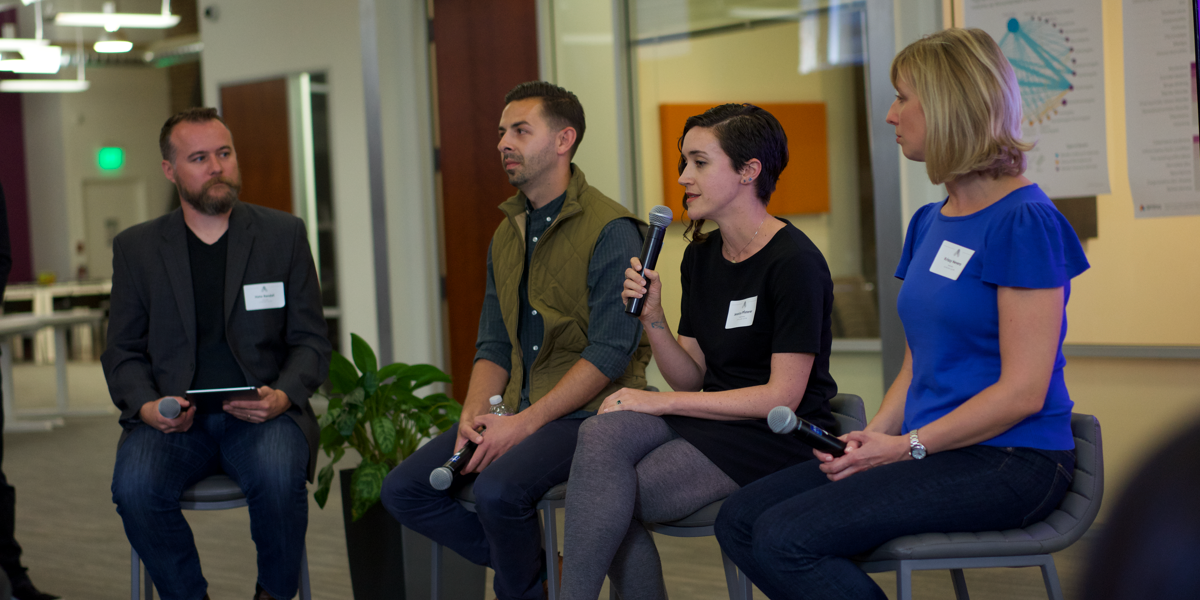Last month, we hosted an event with Lumity and Betterment to have an honest discussion about the employee experience, from the recruitment process to the benefits offerings, and what it takes to make one stand out — especially in the Bay Area where cool perks abound, and the hunt for talent is fierce.
We were fortunate enough to have our expert moderator, Nate Randall from Ursa Major Consulting, guide a productive conversation with our panel of experts: Jessica Pfisterer from Greenhouse, Krissy Nevero from Metromile, and Jonathan Akhavan from Tonal. Here are our top three learnings about what it takes to create and scale an exceptional employee experience:
1. More transparency
A strong theme that emerged during the panel discussion was the importance of transparency. For the panelists, transparency was synonymous with maintaining clear, open communication channels with their employees; providing visibility into which decisions were being made, and why; and promoting practices that encourage two-way feedback. Krissy shared a great example of what transparency looks like in action.
“Every year, Metromile collects feedback from employees in a benefits survey. However, there was concern that the survey results weren’t being looked at in a holistic way. So we shared the survey and external benchmark data with our diversity and inclusion council, (a cross-functional group of employees), and worked closely with this group to make more balanced and comprehensive benefits decisions. The council members became advocates for these decisions, spread the word, and shared the results of survey publicly so everyone could be on the same page.”
“We shared the survey and external benchmark data with our diversity and inclusion council, and worked closely with this group to make more balanced and comprehensive benefits decisions.”Krissy Nevero
Metromile
2. Employees = customers
During the panel discussion, Nate pointed out the parallels between the customer and the employee, and how the new wave of HR teams are increasingly viewing their roles through a “customer success” lens. Just as the most innovative business-to-consumer companies update their products based on customer feedback, the best HR teams listen to their employees and address their needs — within reason, of course. Greenhouse is a company that epitomizes what it means to treat employees as customers.
“At Greenhouse, one of our core values is being customer oriented. This is obviously true for folks on the customer success team, but it also applies to everyone else at the company. On the People Team, being customer oriented means making sure the employee experience is consistent with what we’re telling customers to do. For example, when we rolled out our parental leave policy, we wrote a blog post about it because it’s super important to make sure we’re aligning everything we do internally with what we promote externally.”
“It’s super important to make sure we’re aligning everything we do internally with what we promote externally.”Jessica Pfisterer
Greenhouse
3. Substance over fluff
There was a general consensus amongst the panelists that there’s too much emphasis on “fluff” benefits in the Bay Area. It becomes easy to focus on ping pong tables and alcohol carts, when the real focus should be on the employee’s work-life balance (which is free), financial wellness, and health. Jonathan was an advocate of leaning away from the “perks” culture and leaning into one that’s focused on the most foundational benefits.
“People are starting to care less about fringe benefits and more about work-life balance. This means saying “I respect the fact that I saw you on Slack super late last night. If you want to leave the office early today to go to Sonoma or take care of yourself, do it.” For people with families and spouses, in particular, that type of support is so much more valuable than having a slide in your office. Also, as startups, we need to use the money that’s invested in our companies wisely. So we pay very competitively and take care of our people. But there’s less fluff.”
“People are starting to care less about fringe benefits and more about work-life balance.”Jonathan Akhavan
Tonal
This conversation signals a promising shift in the HR landscape to be more efficient, inclusive, and people focused. We look forward to pushing the envelope when it comes to improving the employee experience — whether it’s by creating a culture of transparency or offering benefits packages that actually serves crucial needs. A huge thanks to our moderator, panelists, and attendees for making our event a success!



